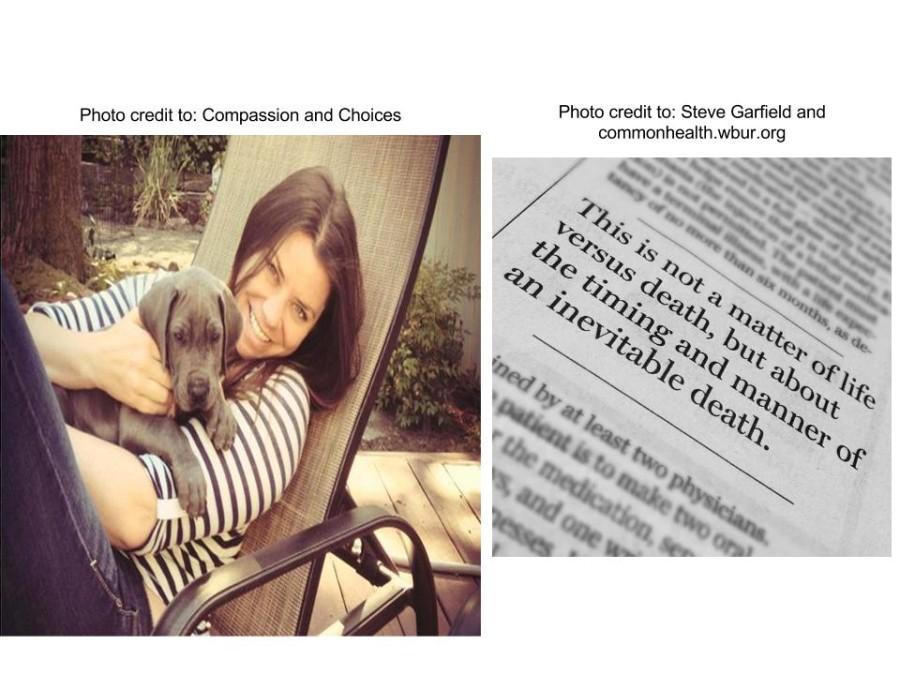“… Men at some times are the masters of their fates./ The fault, dear Brutus, is not in our stars/ But in ourselves…” Shakespeare’s grandiloquent and sage words written over four hundred years ago about the matter of destiny being within the reach of our own control, not some abstract, uncontrollable force of nature within our lives, still ring true today. It’s fair to say that Brittany Maynard would certainly agree with the sentiment.
The 29-year old’s story captured the attention of the nation after she contacted the group Compassion and Choices, who advocates for end-of-life rights, to help promote a video she had posted on YouTube to explain her condition and choice- to end her life by means of a physician-assisted suicide. On January 1st of this year, Mrs. Maynard was diagnosed with an aggressive, terminal form of brain cancer- glioblastoma multiforme- and given a mere 6 months to live. “After months of research,” Maynard wrote, “my family and I reached a heartbreaking conclusion: There is no treatment that would save my life, and the recommended treatments would have destroyed the time I had left.” With that in mind, she decided that death with dignity was the best option for her and her family. But because the law is currently only valid in a few select states, they moved over five-hundred miles away from their Alamo, California home to Portland, Oregon. Deciding to wait to take the medically-prescribed barbiturates that would end her life until November 1st- following her husband’s birthday- she lived out the months she had left traveling to places like Alaska, Yellowstone, and completing her last wish of seeing the Grand Canyon. Ms. Maynard perhaps best sums up her position with “Seize the day: what’s important to you, what do you care about, what matters. Pursue that, forget the rest.”
Of course, this decision was met with serious feedback from many, some condoning the decision and others condemning it. Regardless of the varying opinions, the tragic case undoubtedly drew national attention to the issue at hand: should people be granted the right to die on their own terms? So far, only 5 states have passed legislation that allow terminally-ill patients the right to a death with dignity. But in comes the question of “what is death with dignity?” According to Compassion and Choices, the group that Maynard worked so closely with after making her decision, the law “allows mentally competent, terminally-ill adult state residents to voluntarily request and receive a prescription medication to hasten their death”. With that said, there are certain and strict measures, steps, and requirements that must be met in order to have this law even apply to you. In order to be eligible for the benefits that come with death with dignity (DWDA) privileges, the individual must be a resident of one of the 3 states that have the law enacted (Washington, Oregon, or Vermont), as well as: be 18 years or older, capable of making and thus communicating healthcare decisions for themselves, diagnosed with a terminal illness that will result in death within 6 months, and this all must be confirmed by at least 2 physicians.
While this is offered to every applicable person within these states, not many have taken advantage of the offer. Oregon being the first to pass it in 1997, only a total of 1,173 citizens have had DWDA prescriptions written to them, and a recorded 752 patients have died from ingesting medication prescribed to them under the law. Washington passed the law in 2009, and so far have had only 549 participants and 525 deaths. The state to have most recently passed the DWDA was Vermont in 2013, but has yet to have a single report of a death using the “doctor-prescribed suicide bill”. Although only these 3 states have passed the act, 9 more have had the issue- or a bill very similar in content- sent to legislation. Connecticut, Hawaii, Kansas, and Massachusetts have all proposed but missed the deadline, leaving it unlikely to move forward; New Hampshire presented a similar bill, only to have to House vote against it; New Jersey presented a DWD proposal and had it passed; Pennsylvania has a DWD “up for consideration”; still, though they haven’t presented any death with dignity acts for consideration, Montana and New Mexico have laws that give doctors protection from prosecution over assisted suicide. Why? Because despite the backlash from many Americans over the religious conflicts or healthcare costs or the “absolute power” that can be granted to doctors through it, a majority of people support implementing it. According to a 2013 Huffington Post poll, Americans are about 50/50 split on whether or not to pass Death with Dignity legislation. (Interesting to note, though: a Live Science study showed that 65 percent of medical experts oppose doctor-assisted suicide for terminally-ill patients.)
Ms. Maynard appears to have been the spark that the issue needed to be brought back into the public eye and gain attention needed to make some changes. Though the chance of a nationwide death with dignity law being implemented- simply because it falls so low on importance compared to immigration, international and domestic policy, and the economy- the buzz surrounding the issue has helped to start the conversation about it up again. Maynard frankly said that she made the decision for herself and isn’t trying to influence anyone else with it, and that may be the whole point. The choice to end a life is a very personal, individual one that ought to be made by the person and family. And if the individual is mentally sound, has reached a point where there’s medically nothing else that can be done, and their condition is only going to deteriorate within the short, remaining time they have, why not give them the option to choose what to do with their life? To be the master of their own fate, to refuse to let an illness tell them when their time is and take away the short time they have left, to greet death on their own terms? Why stop someone suffering from an easier way out of their suffering? While the future of the Death with Dignity Act may be questionable, the effect of a single young woman who lived every day as if it was her last on the cause certainly is not.









